FIDE Education Commission announces its 28th “Preparation of Teachers” course
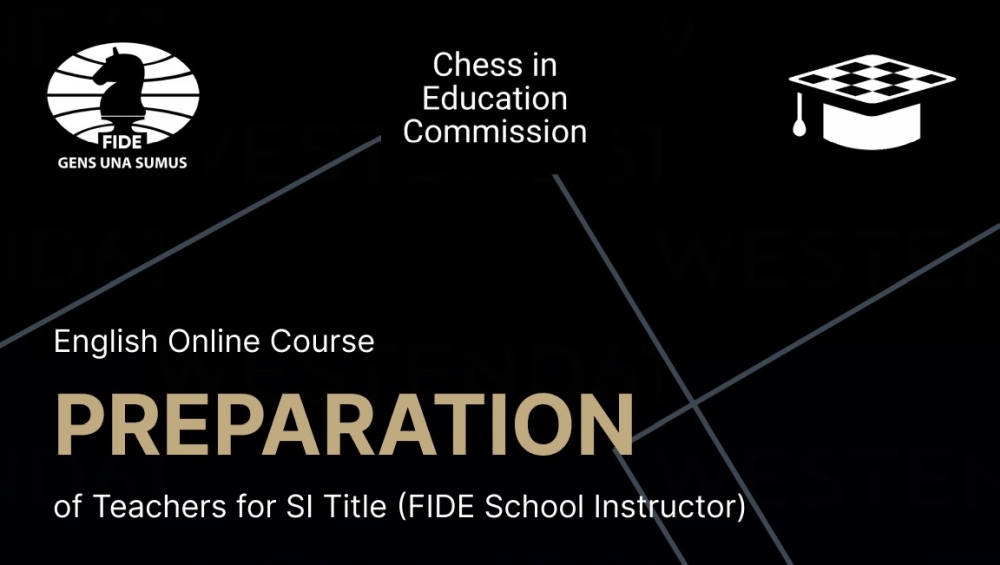
FIDE Chess in Education Commission is pleased to announce the dates of the new Preparation of Teachers course. The course will be held online in English from August 22-24, 2025. The target audience is teachers, chess educators, beginner and advanced players with basic chess knowledge and experience working with children. This brand-new course is focused on chess as an educational tool in the classroom. Participants, based upon their exam results, qualify for the FIDE title of School Instructor. Upon successful completion of the course, participants will be offered lifetime access to the Opening Master premium chess databases, which currently hold more than 9.6 million official over-the-board human chess games and are growing on a monthly basis. Read the detailed course description here. Candidates who wish to attend the course must complete and return the following registration form: cloud.fide.com/s/kBpkMnW4XydtKd5 The cut-off date for applications is August 19. Applicants are accepted on a first-come, first-served basis, and the maximum number of places on each course is 20. Note: Titles are conferred during the subsequent FIDE Council meeting and will reflect on FIDE profiles approximately four weeks thereafter. Share with colleagues and friends! Let’s make chess education more accessible and effective together! If you have any questions, please feel free to contact us at edu.courses@fide.com
FIDE opens bidding process for the 2026 Candidates and Women’s Candidates Tournaments

The International Chess Federation has officially opened the bidding process for one of the most anticipated events on the chess calendar – the 2026 FIDE Candidates Tournament and the 2026 FIDE Women’s Candidates Tournament, two major events scheduled to begin between 25 March and 5 April 2026. As the final step in the qualification for the World Championship Match, the Candidates is the gateway to challenging for the ultimate title in chess. It is one of the most-watched events in the sport, bringing together the world’s best players in an intense battle of skill, preparation, and endurance. Key facts and requirements: 8 participants in each tournament Duration: up to 22 days Minimum prize funds: Open Candidates – €700,000 (up from €500,000 in 2024) Women’s Candidates – €300,000 (up from €250,000 in 2024) Minimum combined prize fund: €1,000,000 All organisers must respect FIDE sponsor and partner rights, including video and game broadcast Bids are open to any FIDE member federation or organiser approved by their national federation. The bid submission period runs from August 12 to October 15, 2025 (23:59 Lausanne time), with all documents submitted in English to office@fide.com. The FIDE General Strategy Commission will evaluate all applications, and the FIDE Council will approve the final host city. Full bidding regulations for both events can be found in the official documents: Regulations for the FIDE Candidates 2026 Regulations for the FIDE Women’s Candidates 2026 Call for bids – FIDE Candidates Tournaments 2026 Bidding Form (DOCX)
idChess Technology at the WSTCC 2025: Live streaming, VAR, and video highlights
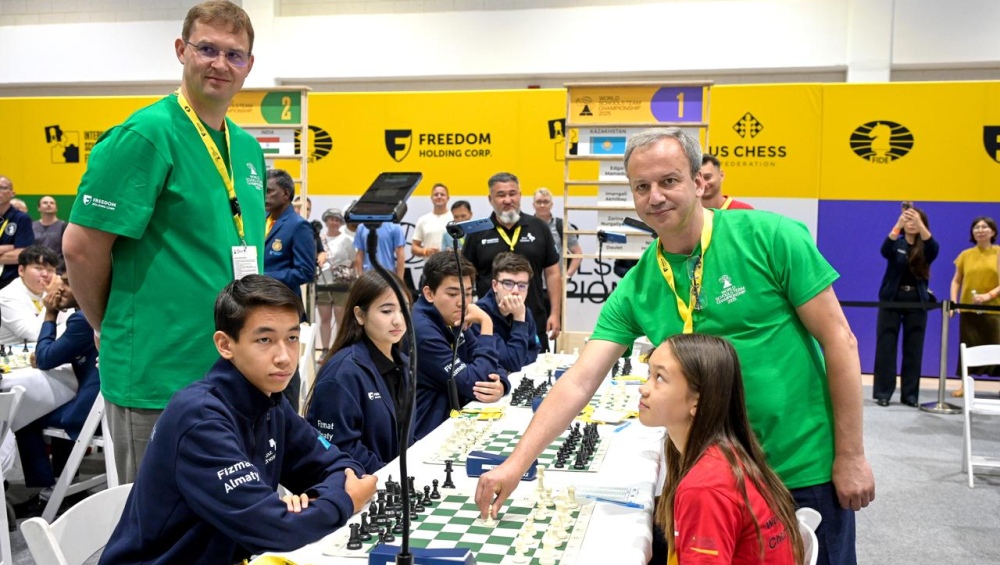
The 2025 World Schools Team Championship took place at Episcopal High School — just 11 kilometers from downtown Washington, D.C. — from August 3–7, bringing together over 50 teams from six continents. For the first time in the history of the competition, it featured innovative idChess technology for real-time game broadcasting to chess fans around the world. idChess enables live game broadcasting on any chessboard using only a smartphone: phones are mounted on tripods beside the boards, and games are automatically converted into PGN format through computer vision and AI technologies. The platform also supports VAR — a video assistant for chess — helping arbiters make informed decisions in controversial situations. In July 2023, FIDE announced the adoption of idChess VAR at international tournaments, marking a new approach to officiating and ensuring fair play while providing players, coaches, and fans with richer content and deeper insight into games. Another notable feature is the automatic creation of video highlights. Trained on millions of chess games, the idChess neural network identifies and marks the best moves and combinations. The platform then generates short video clips, which tournament organizers can publish on their page on the idChess Media Platform. Watch the games of the World School Team Championship here. “The World Schools Team Championship is not only a celebration of young chess talents but also a platform for innovation,” said FIDE President Arkady Dvorkovich. “By integrating idChess into this year’s event, we are setting a new standard in how youth competitions are run and experienced around the world. It reflects our commitment to making chess more accessible and engaging, especially for the next generation.” idChess technology is now used at tournaments in more than 150 countries, including national championships, international opens, school competitions, and regular chess club meetings. The platform is recognized for its simplicity, requiring only smartphones, tripods, and a stable internet connection. For organizers, idChess offers a fast and affordable way to enter the world of digital broadcasting. Schools and federations can adopt the system with minimal technical training, opening new possibilities for promotion, engagement, and game review. Organizers can submit a request to receive free access to a tournament organizer account. idChess official website: idchess.com/
FIDE World Junior Rapid and Blitz Championships 2025: Registration deadline extended
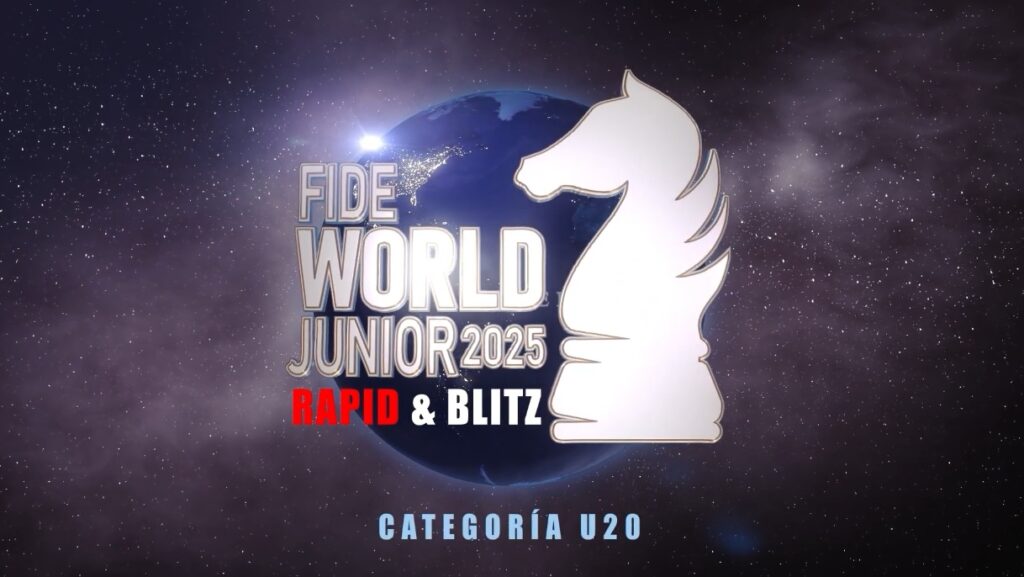
FIDE and the Peruvian Chess Sports Federation invite all FIDE member federations to participate in the World Junior U20 Rapid & Blitz Championships 2025. The championships will be held in Lima, the capital of Peru from September 22 (arrival) to September 29 (departure) 2025. Each federation can register an unlimited number of players. The winners of the World Junior U20 Rapid and Blitz Championship 2024 and the first 10 players on the starting list (10 from the open list and 10 from the girls’ list) will receive free accommodation in a double room and full board. FIDE member Federations should proceed with the registration of their participants. The registration deadline has been extended to August 22, 2025. E-mail: juniorrapidblitz@fide.com Official website: fidewj2025.com/ Regulations, schedule, visa information (PDF) https://youtu.be/jbd8YVORXTY
Michael Adams wins his ninth British Chess Championship; Yao and Mirzoeva tie for Women’s title
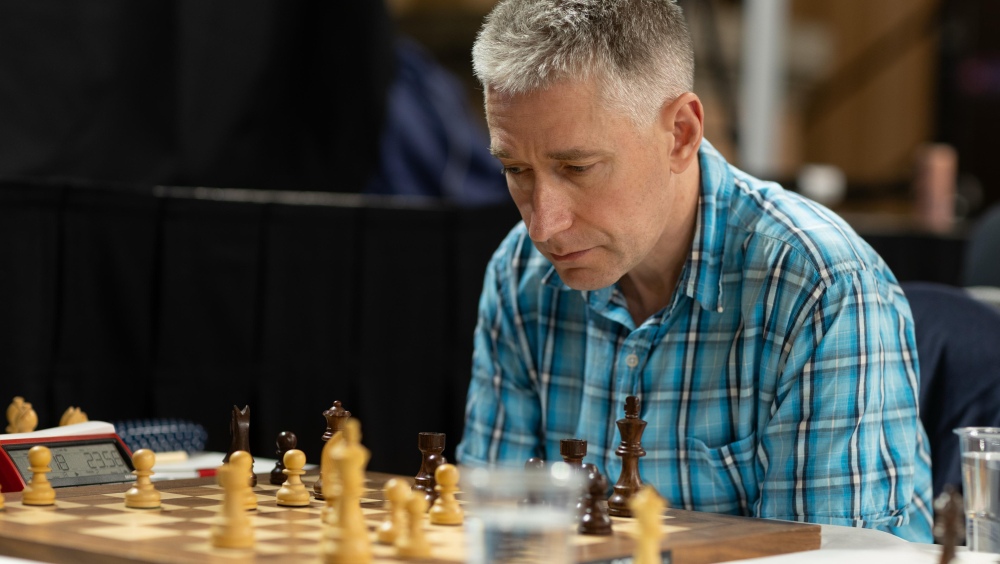
Michael Adams, the king of British chess, won his ninth national title on Sunday in a sensational three-way playoff finish to the 111th British Chess Championships in Liverpool. The 53-year-old Cornishman, nicknamed “The Spider”, showed all his class to win the rapidplay tiebreaker ahead of International Master Peter Roberson and Grandmaster Stuart Conquest, the 2008 champion. All three had tied on 7/9 during the regular nine-round championship at Liverpool’s magnificent St George’s Hall. Full list of prizewinners here Adams, who led throughout, takes home £5,000 and the British Crown Trophy he first won in 1989 from the English Chess Federation organised event. Meanwhile, Lan Yao and Elmira Mirzoeva, both WGM title-holders, were crowned joint 2025 British Women’s champions. Lan drew in the final-round, while Mirzoeva won to finish level on 6/9. It was Lan’s fourth title in a row and Mirzoeva’s first. Other notable results: 10-year-old Bodhana Sivanandan won her final WIM norm William Claridge-Hansen has an IM norm 11-year-old Supratit Banerjee gained an IM norm Roberson and Conquest, the winner the last time the British was in Liverpool 17 years ago, both had an incredible tournament. The playoff format dictated Roberson and Conquest fight it out for the right to play Adams over two 10+5 games. The 58-year-old Conquest (pictured below), affectionately known as “The Fox”, rolled back the years to emerge with a 2-0 win and get a chance to take the crown. But, in a battle of the golden oldies, the overwhelming favourite Adams was too strong and claimed the 2025 title. Adams is now behind only Jonathan Penrose, who won 10 titles between 1958 and 1969, in the all-time list of British champions. “Another brilliant win for the Cornish sensation,” Grandmaster Danny Gormally, the ECF’s expert commentator, said. “An unbelieveable score!” Over 1,000 chess players from across the UK, including the best of Britain’s grandmasters and child prodigies, had descended on Liverpool to take part in a series of tournaments and wider chess events held over nine days. The final round of the elite nine-round Swiss championship started on Sunday with six players locked on 6/8. Any one of three grandmasters in Adams, Nikita Vitiugov and Conquest plus three International Masters in Roberson, Richard Pert and the Pole Maciej Czopor could have gone on to win. It was tense. First, Roberson downed Pert to go ahead before Adams won his final game to force a playoff with a trademark grinding win over Czopor. Conquest, who was in also fine form throughout, then won his place in the playoff by sensationally downing England’s current number-one Vitiugov. “I don’t think we’ve seen the best yet of Vitiugov, I’m pretty certain of that,” Gormally said. “He will win national titles, there’s no question about it. He wasn’t at his best in this tournament.” Shreyas Royal, England’s youngest ever grandmaster (pictured below, right), had challenged until the eighth round when a loss to Conquest ended his chances. The 16-year-old was then beaten at the last by 22-year-old International Master Jonah Willow. However, Royal’s strong showing demonstrated his time will come. Another youngster who put in an impressive show was 11-year-old Supratit Banerjee who finished on 6/9 having beaten two grandmasters and sealed his first IM norm. Gormally tipped the youngster as a shoe-in for a future British champion. Gormally also heralded the performance of 10-year-old Bodhana Sivanandan who turned around a losing position in the final round to beat the experienced Grandmaster Peter Wells. Looking at the game, Gormally said: “How on earth did she win this? She must be some kind of magician!” Sivanandan secured her final WIM norm and is another tipped for a big future. Defending champion Gawain Jones finished on 6.5/9. He said afterwards he “wasn’t quite firing” during the tournament. The 2026 British Chess Championships, which includes age-group events from under-8 to seniors, will be held at the University of Warwick in Coventry, the English Chess Federation has announced. The event in Coventry will be the 112th British Chess Championship in a series which has run almost unbroken since 1904. Written by Leon Watson, English Chess Federation Photos: Yuri Krylov, English Chess Federation Official website: britishchesschampionships.co.uk/
Queen’s Gambit Challenge Stage 2: Registration now open
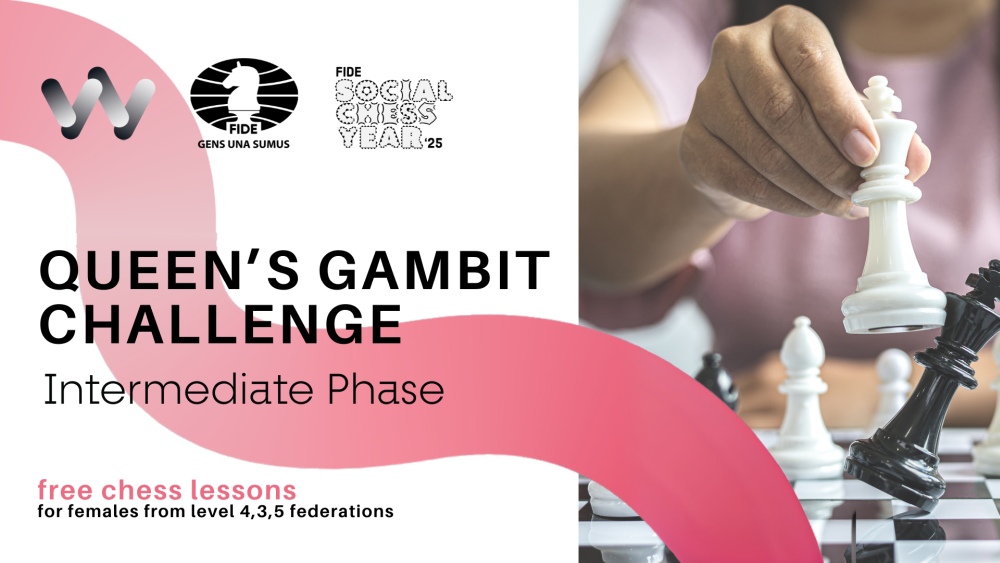
FIDE and WOM are excited to announce that registration for Stage 2 of the Queen’s Gambit Challenge – Intermediate Training is now open! Following a hugely successful first stage, which brought together 380 female players from over 50 countries, we’re back to support the next chapter in your chess journey. This stage is designed especially for female players from Level 3, 4, and 5 federations who are ready to enhance their skills, deepen their understanding of the game, and take steps toward representing their country in events like the Women’s Olympiad. The program is completely free and runs for seven weeks, featuring online lessons led by internationally recognized coaches. Key Details: Registration Deadline: September 6, 2025 Start of classes: September 20, 2025 Format: Online training led by experienced, internationally recognized coaches Duration: 7 weeks Who can join: Female players of any age from FIDE Level 3, 4, and 5 federations This initiative is part of FIDE’s broader commitment to increasing women’s participation and excellence in chess worldwide. Eligibility:Female players from FIDE Level 3, 4, and 5 federations. How to Register:Eligible participants can register by completing the form HERE. FIDE Development Levels – List of federations Federations are encouraged to invite and support their female players in taking part. Dana Reizniece, FIDE Deputy Chair of the Management Board and long-time advocate for women in chess, shared her thoughts on the initiative: “The Queen’s Gambit Challenge is not just about building chess skills, it’s also about building confidence. We want every girl and woman to feel that there’s a place for her in the chess world, no matter where she starts.” Whether you are continuing from Stage 1 or joining for the first time, we look forward to helping you take the next step in your chess journey. Let’s continue building a stronger future for women in chess, together!
Velammal MHS School (India) takes gold at 2025 World Schools Team Championship
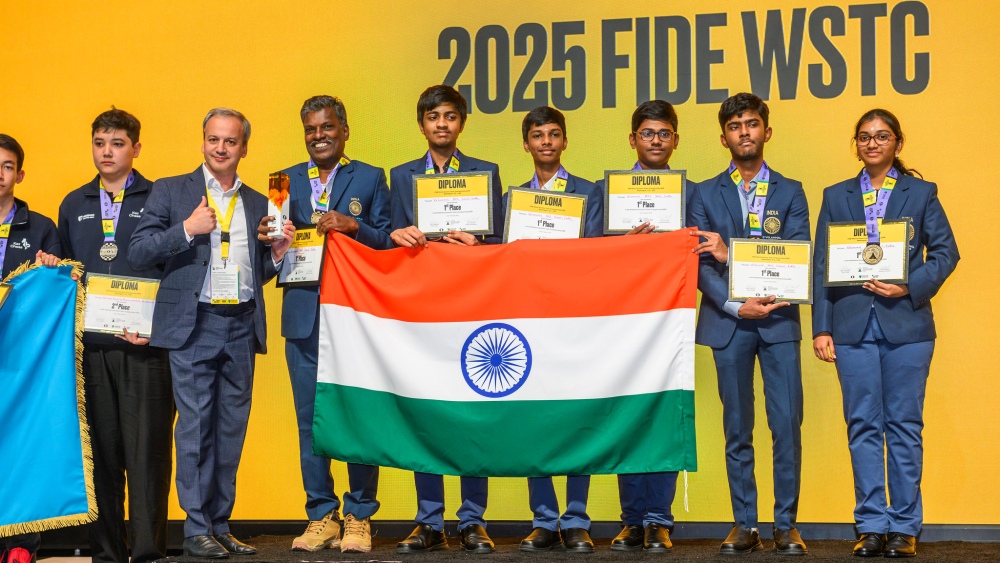
After eight exciting rounds, the 2025 World Schools Team Championship wrapped up today in Alexandria, Virginia. Set on the beautiful campus of Episcopal High School, the event brought together some of the most talented young chess players from around the world. Rising above the rest with a perfect score, Velammal MHS School from India claimed the gold medal, winning all eight of their matches. With India continuing to make waves across all levels and formats of chess, this victory adds yet another title to the country’s growing collection. Velammal MHS is no stranger to success—former students include Grandmasters R. Praggnanandhaa and Leon Mendonca. So it came as little surprise when the team entered the final round with the top spot already secured. The race for second place was much closer, with seven teams still in contention heading into the final round. Kazakhstan’s National School of Physics and Mathematics ultimately clinched the silver medal, finishing with the same number of match points as The Harker School (USA) but edging them out on tiebreaks. The Harker School earned a well-deserved third place, just ahead of Astana 2 RSPM, who narrowly missed the podium. Top 10 Final Standings: Complete final standings In addition to team honors, board medals were awarded to players who delivered outstanding individual performances. Three participants finished with perfect scores (8 out of 8)—a remarkable achievement: Imangali Akhilbay (KAZ – National School of Physics and Mathematics) on board two (pictured below, left), Edisa Berdibaeva (KGZ – School-Gymnasium No. 11, Karakol) on board three, and Pranav K. P. (IND – Velammal MHS School), who played reserve on board five. After the final moves were played, players were treated to fun and educational excursions in Washington, D.C. They visited the National Museum of Natural History and the National Air and Space Museum —two of the city’s most iconic landmarks. With most teams heading home the next day, these outings were the perfect way to cap off their time in the U.S. The week came to a close with a vibrant closing ceremony in the auditorium. The evening kicked off with music, audience engagement, and a warm welcome from the host, followed by the U.S. national anthem. David Hater, FIDE delegate and Executive Board Member of the U.S. Chess Federation, gave opening remarks before the FIDE anthem played. FIDE President Arkady Dvorkovich then took the stage to address the audience, extending his congratulations to the champions and gratitude to all who contributed to the event’s success: “I want to start by congratulating the winners on their great result! Your success is well-deserved, and I hope you leave here with not only medals but also with experiences that will encourage you to achieve more in life. And to all the other teams and their coaches, thank you for the passion and sportsmanship you showed. You have all made this event into a true example of what chess is all about; sportsmanship, friendship, creativity and progress.” A highlight reel followed, showing memorable moments from the week and drawing cheers as players spotted themselves and their teams on screen. Chief Arbiter Alex McFarlane then addressed the crowd, thanked the officials and arbiters, and confirmed everything was in order to begin the awards. Board medals were handed out one by one, with FIDE Vice Presidents and officials joining the Chief Arbiter to present the honours. Tournament Director Nadzeya Krauchuk took the stage next and introduced a second video, this one capturing the off-the-board moments that defined the spirit of the event. (All videos and content can be found on the official FIDE YouTube channel). Then came the big moment: the team awards. The top three schools were announced, with Velammal MHS School stepping onto the top of the podium as confetti filled the air and the Indian national anthem played. It was a joyful celebration of a week of dedication and hard work. Flags were raised, as FIDE President Arkady Dvorkovich returned to the stage to officially declare the 2025 World Schools Team Championship closed. As the curtain closes on this remarkable event, what remains are the connections, memories, and achievements shared by students from across the globe. The 2025 World Schools Team Championship will be remembered not only for its competitive excellence, but also for its message of unity, friendship, and the future of chess. Written by Charlize van Zyl Photos: Michal Walusza Official website: worldschoolteam2025.fide.com/
Smart Moves Summit sets out global vision for chess in education
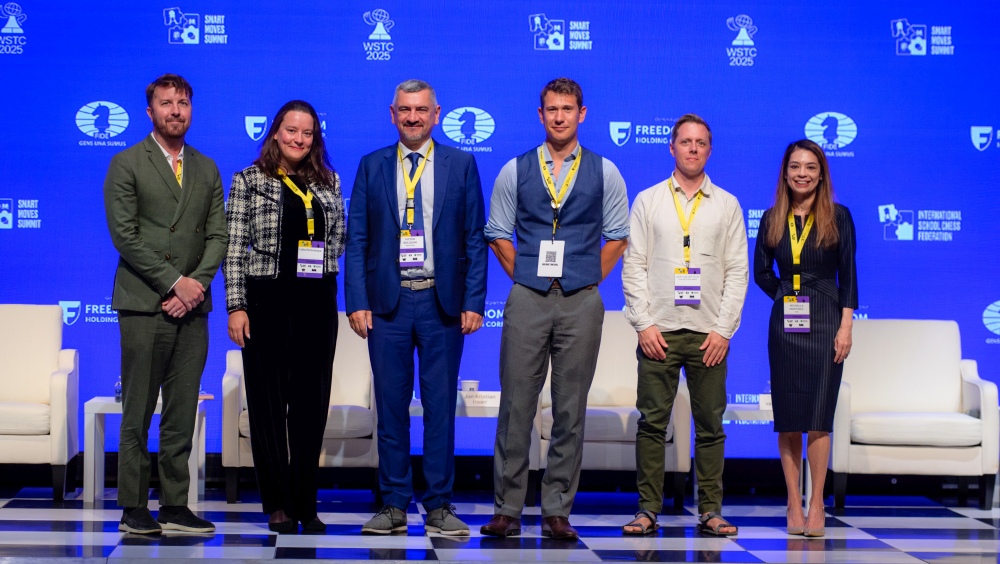
The first-ever global conference on the role of chess in education concluded in Washington D.C. today with a call to governments and education institutions to integrate chess into formal and informal learning environments, including schools. Over 50 speakers – including eminent scientists and researchers in the fields of education and cognitive studies, educators, coaches, leaders of state and international chess projects, chess-tech entrepreneurs, government officials and influencers – took part in the two-day event aimed at discussing the educational and cognitive benefits of chess. Organised by FIDE and the International Schools Chess Federation, and sponsored by the NASDAQ-listed Freedom Holding Corporation, the second day of the Smart Moves Summit saw lectures, panel discussions and presentations ranging from real human stories on how chess helped change the lives of people around the world, to building financially viable chess initiatives and private-public partnerships, to how social media is redefining the image of chess. The conference concluded with a declaration, setting the ground for a global effort to get national and international bodies and institutions to formally recognise and include chess in education and social programmes. The declaration calls for the integration of chess “into formal and informal learning environments, including public schools, after-school programmes, and digital platforms”. Steps to be taken include providing teacher training, curriculum framework, and evidence-based support to scale sustainable chess education programs. The signatories of the declaration have committed themselves to expanding access to chess education in underserved communities, addressing gender disparities and ensuring inclusive practices for children with disabilities, refugees and the displaced. True stories of chess changing lives The central panel discussion on the second day of the “Smart Moves Summit” titled “The power of chess to change lives”, offered a compelling look at how the game has transformed the fortunes of people from challenging backgrounds. Dr. Jenny D. Ingber, President & CEO of Chess in the Schools (pictured above), opened the session by recounting the journey of a young student named Eva, who went from a curious beginner to a confident competitor and mentor. Ingber emphasised that for many low-income students, chess serves as a “mirror, a ladder, a doorway” to a better future. “Chess does not care where you’re from, how much money your parents make or what language you speak,” Ingber said, “It only asks, can you think ahead?” Rochelle Ballantyne, a litigation associate and alumna of the Chess in the Schools programme (pictured below), provided her own account of her journey as a low-income Black girl from Brooklyn to a lawyer. She credited her family and Chess in the Schools for her success, while also openly sharing her experiences with racism and exclusion at tournaments. Ballantyne stated that her “pride became a foundation, giving me the strength to push myself in the face of discomfort and adversity.” Kwadwo Acheampong, a Senior VP at PIMCO and another program alumnus, spoke about how chess provided him with structure, confidence, and community as a shy immigrant child in the Bronx, and even influenced his career in finance. Acheampong underscored the lesson that “it’s not often the moves you make that are important, but the moves you don’t make”. He concluded by stating that “chess gave me the platform and the confidence to say, ‘I am a leader’”. A coach and social entrepreneur from Uganda, Robert Katende (pictured below), shared stories of how chess has transformed the lives of youth living in slums and those with disabilities. He detailed the journeys of two people – one who became a national champion and then an engineer, while the other – a disabled player – competed internationally and got to step outside of Uganda thanks to chess. Katende’s philosophy is centred on producing “life champions” rather than just titled players, explaining, “I may not have produced Grandmasters, but I have produced thousands of life champions”. David Heiser (pictured below) and Arlecia Taylor from the Renaissance Knights Chess Foundation and Chicago Public Schools, respectively, highlighted their work in Chicago’s underserved communities. Their initiatives, which range from police-student programmes to mentorships for children, focus on inclusion, healing trauma, and creating opportunities. They described chess as a “great equalizer” and a tool that teaches children that “maybe my next move matters.” How to better market and present chess to the public and the sponsors As chess is increasingly being used in education, one of the conversations emerging is how to better market and present chess and its benefits to a wider population. This was the topic of the “Strategic Partnerships: Sponsorship and Marketing at the Crossroads of Chess and Education” at the Smart Moves Summit. Lidia Perovskaya (pictured above), head of communications for the International Collegiate Programming Contest (ICPC), shared her organisation’s approach to promoting their work. Perovskaya emphasised the importance of the entire community sharing the rewards of the game, so “even if you’re not in the top 10, you would still have plenty of opportunities and become part of the community”. She identified three key categories of partners: academic, corporate, and general brands. She emphasised that partnerships work best when sponsors share the vision of building a community first and foremost. “We are always looking for long-term relationships for meaningful partnerships,” she said, stressing that they seek companies who are “truly invested in a long-term game”. She noted that universities and schools, as academic partners, provide an “instant connection” because they share a core value of seeking talent and ambition in young people. Moldovan Grandmaster and FIDE Executive Director Victor Bologan (pictured above) addressed what he sees as the main problem in modern chess: its fragmentation. He explained that while the chess world has many excellent elements, it lacks a unified ecosystem that brings together online platforms, clubs, organisations, and individuals under one umbrella. To solve this, Bologan is developing Chess ID, a new company aimed at creating a single “window of access” to all chess services for players and partners. Bologan believes this platform will make chess more organised and accessible. He noted the number of FIDE-registered
Velammal MHS School of India pulls ahead at the World Schools Team Championship
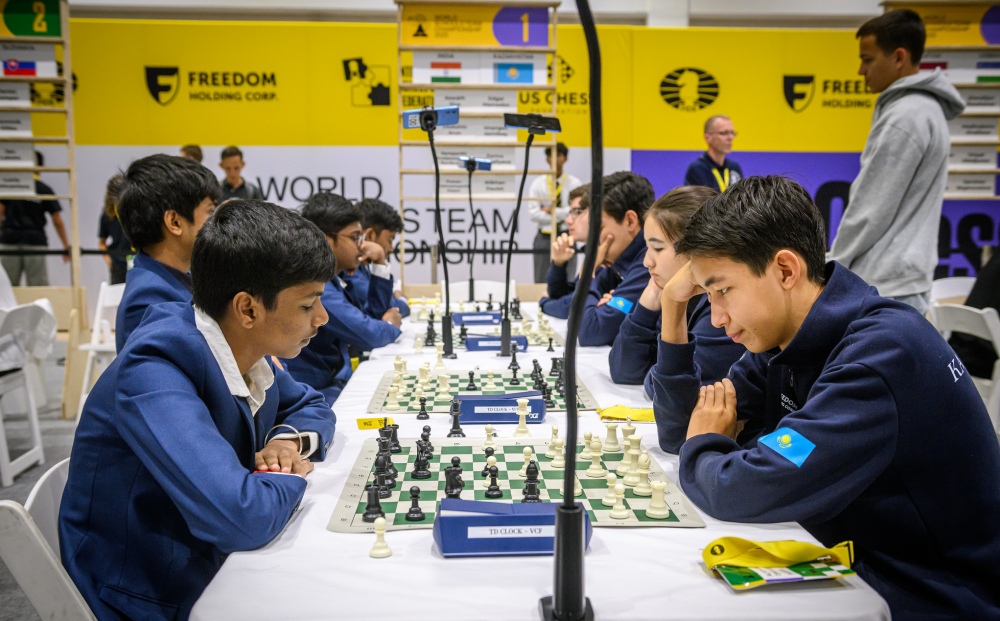
Day 3 of the World Schools Team Championship delivered another dose of high-stakes drama and memorable moments, both on and off the board. With two rounds played, the competition intensified as top contenders clashed, and underdogs continued to defy expectations. At the close of the day, India’s Velammal MHS School leads the event, holding strong as the tournament moves toward its final stage. All eyes in Round 5 turned to the top board, where a clash between the first and second seeds took centre stage. Kazakhstan’s National School of Physics and Mathematics faced off against Velammal MHS School in a match that lived up to the hype. With board one ending in a draw, it was the bottom two boards that made the difference; both claimed by the young Indian team, securing them a critical victory in the fight for first place. Meanwhile, Sri Lanka’s Royal College, Colombo continued their amazing run with another upset, this time against Slovakia’s Gymnázium, Grösslingová 18, Bratislava. The final score was 2.5-1.5, with all boards drawing except for board two, where the 1620-rated Sri Lankan player stunned his much higher-rated opponent (rated 2016) with a beautifully played finish. This victory propelled Sri Lanka into joint lead, setting up a highly anticipated Round 6 showdown against India with both teams entering the match on perfect scores. In this top-of-the-table encounter, between Velammal MHS School and Royal College, Colombo the Indian team proved too strong, claiming a convincing 3.5-0.5 victory over with two wins and two draws. The result solidified India’s position at the top of the standings heading into the final rounds. Away from the competition tables, the tournament continues to offer a wide range of activities designed to create a fun and social atmosphere for the players. As mentioned in previous updates, the players’ lounge remains a popular hangout, with its mix of games, beanbags, and chill-out zones. But the fun doesn’t stop there – each day wraps up with group activities, from basketball to nature walks, there are a lot of options for the kids to enjoy and socialize with each other. Today’s end of the day activity included a swanky silent disco – which, if you are older and haven’t heard of or experienced before yet (like me!) it is a party setting where music is played through individual headphones for every person. A wonderful setting for fun and to make new friends! Earlier in the day, and also ahead of the championship, players were treated to an excursion to the US Capitol, offering them the chance to take in some local history and culture. Tomorrow marks the seventh and eighth rounds of the tournament. With tensions mounting, and only one day left to play, the stage is set for an exciting finale that will determine the 2025 World Schools Team Champions. Moment of the day The result from round 5 with Sri Lanka’s Royal College beating the higher seed Slovakia’s Gymnázium, Grösslingová with a critical victory, is an incredible result in itself. But the way the decisive game ended made it even more memorable: White just blundered with 26.Qd4?? And suddenly the white king was in grave danger. Black pounced with 26…Qf3! (26…Nf3 was more accurate, but the move played was both elegant and effective). White tried 27.Nf4, defending the g2-pawn but it failed to 27…Nh3+! 28.Kh1 Nxf4 29.Rg1 Nxg2 30.Qb2 and White resigned, facing imminent checkmate after 30…Nf4+. Top 10 after Round 6 Smart Moves Summit Day two of the Smart Moves Summit focused on how chess connects with business, communication, and education. The day opened with a series of TED-style talks exploring the transformative power of chess, followed by a panel on sponsorships and strategic partnerships at the crossroads of chess and learning. Keynote speakers then discussed how to build sustainable school chess programs, and a roundtable discussion featuring top streamers and chess social media managers explored the growing role of social media, gaming, and online platforms in chess promotion. Alongside the main sessions, masterclasses covered topics such as inclusive environments, fair play through data, and effective training methods. As the summit concludes and the final rounds of chess approach, both the competitive and educational aspects of this event reflect the richness and global reach of the chess world. Written by: Charlize van Zyl Photos: Michal Walusza Official website: worldschoolteam2025.fide.com/
Making the case for chess in the classroom: The first day of the Smart Moves Summit
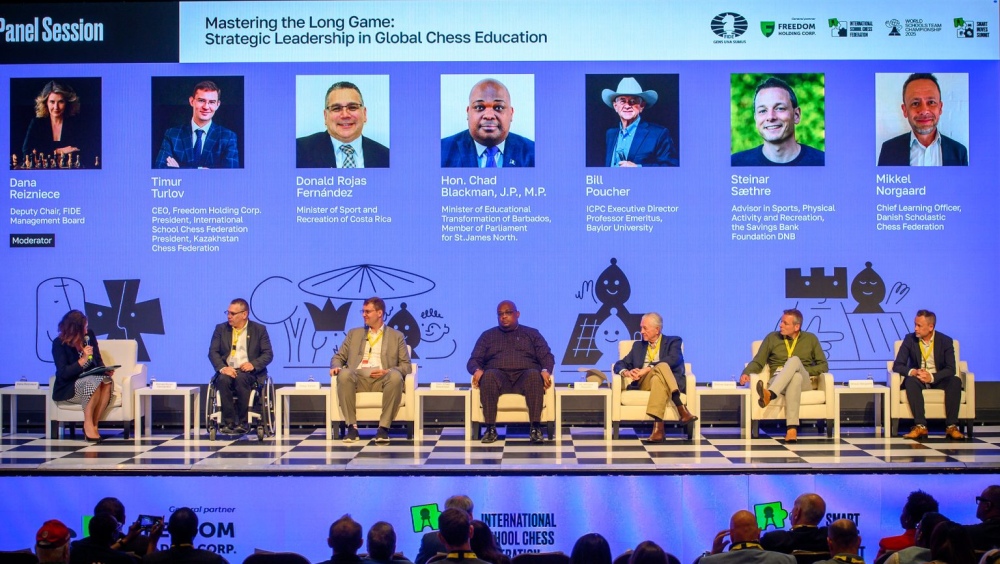
The Smart Moves Summit – a first of its kind global education conference focusing on the transformative power of chess in education – opened in Washington D.C. The prestigious Episcopal High School in Alexandria will, for two days, play host to government officials, scientists, researchers, EdTech entrepreneurs, innovators, and chess experts. The international conference aims to build a global framework for cognitive development through chess and promote the game’s role in education. The Smart Moves Summit is organised by FIDE and the International School Chess Federation (ISCF), with sponsorship from Freedom Holding. Congressman Jamie Raskin, of Maryland’s 8th congressional district, opened the event. Raskin, a prominent fan of the game and a staunch supporter of chess in education, noted that the U.S. Chess Center, a significant and historically noteworthy non-profit located in his district, has taught chess to over 40,000 students. Chess as a mechanism for non-violent conflict resolution Congressman Raskin noted the importance of chess “as a mechanism for non-violent conflict resolution and strategical critical thinking”. He argued that chess is crucial to solving modern societal problems, as it promotes critical thinking over propaganda, strategic planning over impetuous behaviour, and non-violent, diplomatic resolution over violence. “Chess can be a major part of the solution to the problems that beset Humanity right now. It seems like we’ve got a bunch of choices to make, what is? Are we going to try to promote critical thinking skills among young people, or are we going to promote Dogma and propaganda in fake news and conspiracy theory,” Raskin said. He noted that, while chess promotes healthy competition, this competition is ultimately with oneself to achieve higher levels of thinking, and must be linked with a sense of community. Congressman Raskin thanked FIDE President Arkady Dvorkovich and Freedom Holding CEO Timur Turlov for organising the Smart Move Summit, stating that their work is essential “to get us through the current crisis in world affairs in politics and in government”. Fighting for focus in a fast-moving world Timur Turlov, President of the ISCF and CEO of Freedom Holding, spoke about the challenges of living in a fast-moving world and the importance of adapting educational systems. He highlighted the “ability to keep concentration” as the most valuable asset in an attention economy, and proposed that chess is an excellent tool to train this skill. Turlov gave details of an initiative to implement chess in over 500 schools in Kazakhstan, with plans for more, and mentioned that scientific studies are underway to measure the results. “We believe that the most valuable thing in our life now is our ability to keep concentration… and I really believe that chess could be a very great tool to overcome this challenge. Because chess is a very interesting game, it’s a game that can keep your attention for a long period of time and is a beautiful way to train your ability to concentrate,” Turlov said. Arkady Dvorkovich on the importance of school chess championships for children In his address, FIDE President Arkady Dvorkovich highlighted the importance of evolving educational systems to keep pace with rapid technological change. He argued that despite technological advancements, personal interaction remains key to the exchange of ideas and improvement. Advocating the vital role chess has in education, Dvorkovich pointed out that events such as school championships, which put children in different settings to their everyday lives, are an important point of communication breeding progress. “The whole idea of the World Schools Team Championship also came from that Soviet tradition,” Dvorkovich said. “My father was involved in that. By introducing chess into the educational system, we put students in these situations that are unknown in the classroom since they have to face a different world… they have to face some moves that matter, some smart moves, and they start thinking about how those pieces interact and how to think about the whole chessboard, and the surrounding, not just about one square.” Real examples: How chess is changing education and improving societies The first day of the Smart Moves Summit featured five panel discussions and a workshop. The topics included the role of chess in early and primary education, a global case study analysis on using chess to advance gender and socio-economic equality, and the opportunities of digital and educational platforms to harness the game’s power. Other sessions focused on aligning chess-based learning methodologies with public education goals, and a chess and math workshop. The central event of the day was a panel titled “Strategic Leadership in Global Chess Education,” which discussed long-term strategies, cross-sector collaboration, and how to drive initiatives to include chess as a part of official government policies. Moderated by Dana Reizniece, Deputy Chair of the FIDE Management Board and the former Latvian Minister of Finance, the session featured government officials and program heads of organisations focusing on chess in education. Timur Turlov, CEO of Freedom Holding, set the stage by describing chess education as a “long-term investment” in the mindset of an entire generation rather than “charity”, as its often seen. “Strategy, self-control, attention management, the ability to think as part of a team—these are skills no modern leader can do without,” Turlov said. “And if we want these questions to develop internationally, we must integrate chess into the education system as a core subject.” Turlov concluded by outlining his goal to build a global exchange platform for best practices in work and life principles, built through chess. The discussion quickly shifted to the political and practical implementation of chess. Costa Rican Minister of Sport and Recreation Donald Rojas Fernández shared compelling data from pilot programs, revealing a decrease in bullying and an average eight percent increase in math and science grades among students who learned chess. “The numbers don’t lie,” Fernandez stated, underscoring that the positive academic and social outcomes of implementing chess in education. This also helped influence the decision of the government of Costa Rica to make chess a national priority. Echoing this sentiment, Minister Chad Blackman of Barbados

